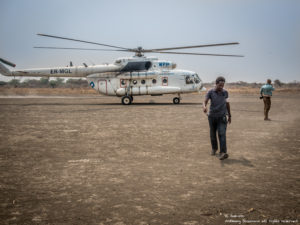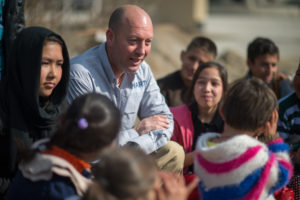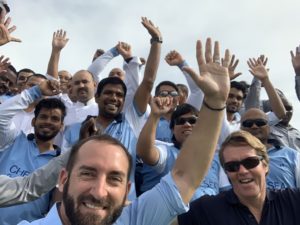An unfamiliar environment, with unfamiliar people and where your safety isn’t guaranteed. Working in a conflict-affected area is not a feat for many. Whether humanitarian or service based, it takes a certain type to head to conflict-fraught regions and call it their home and workplace for extended periods of time. But there are many people who are able to, and do so successfully.
The companies within the Chelsea Group operate in some of the most complex regions in the world and a significant number of our employees work in a high-risk area.
Understanding who is the right fit is integral to Chelsea’s operations: for example when risk and security specialists Hart search for their next Country Manager or secure accommodation provider Chelsea Village recruit for its Mogadishu team. Then there is CTG who specialise in the recruitment and management of humanitarian staff in conflict-affected areas. Working across 19 countries, while their focus is on hiring locally (92% of CTG staff are local) there are a number of international aid workers deployed through their channel.

Respect & Resilience
Jamshid Poyan, Regional Finance Manager for Hart, has been with the Chelsea Group for 15 and a half years. Born in Afghanistan, he has worked in numerous roles in numerous countries, from Country Manager to Regional Finance Manager, worked with a diverse range of nationalities. When asked what qualities an international staff member would need to be successful working in a country like Afghanistan, many of the points he suggests could be translated to all types of jobs around the world. But of course the reality of a ‘stressful day at work’ is different when working in conflict-affected regions.
While there may not be the perfect person for roles in these regions, there are a few essential characteristics. Jamshid suggests the right candidate would have effective planning and organisational skills, be able to make timely decisions, and not be afraid to take the initiative. He also places emphasis on “knowing and respecting local context and culture, being culturally adaptable and respecting your co-workers. And of course being effective in stressful situations.”
Having mental resilience and a high level of stress management is also important, as these jobs are often governed by strict deadlines and changing circumstances where urgent decisions need to be made with confidence.
When it comes to working in humanitarian roles in high-risk areas James Veysey, COO of CTG, had the following advice: “People with a natural curiosity, an openness of mind, the humility not to assume that the “aid givers” have the answers and the simple gift of striking up conversation with absolutely anyone are all qualities that stand you in good stead as a humanitarian worker.”

Preparation & Training
While there is no one-size-fits-all approach, an individual needs to prepare as well as have the necessary experience. “To those who are going on their first international assignment, do your research on every aspect of the country you going into,” says Jamshid. “It will help you significantly with living and working there.” And for those who have been deployed before: “Keep in mind that every region has its own specific customs, rules and regulations. The knowledge you have gained from your previous experience might not apply elsewhere.”
A degree of training is also required, though the level and particulars of this will depend on the role. At CTG, there are four compulsory courses ranging from Safeguarding to B-SAFE that all staff have to complete via the e-learning platform CTG Learning before deployment. This is compulsory for all staff, especially those working in a United Nations role.
Wellbeing Support – Knowing When to Reach Out
Having a support network is an essential part of any individual’s wellbeing, and more so when working in a conflict-affected area. An often overlooked requirement, employees working away from home need to be able to find the time as well as the place to unwind. Even a simple sundowner on the roof of a container accommodation camp or being able to jog along the coast of the safe zone can make all the difference to mental and physical wellbeing.
General Camp Manager at Chelsea Village, Costa Yiannakis has over 20 years of experience working in conflict zones. For him, listening to understand rather than to hear is one of his key learnings. A family man, he also stresses the importance of giving time to loved ones back home, even in the throes of your busiest week. “Give daily time to your family back home,” he says. “Set times throughout your day to connect – they are your strongest pillar for support.” It’s this understanding that translates into the experience at Chelsea Village, with residents often commenting on the homely feel, the sense of community and opportunity to do more than work.

CTG’s commitment to their staff in the field led to the training of Wellbeing First Aiders who are the first point of contact for consultants seeking assistance for their stress or mental health challenges, as well as creating CTG Wellbeing, an online counselling service available to all staff, with multiple language options.
Jamshid Poyan’s concluding thoughts are that “working in conflict-affected regions has unique characteristics. Always be prepared to take on the new challenges and you will enjoy working there along the way.” James Veysey, CTG’s COO, sums up the experience: “It is tough, often monotonous, sometimes dangerous, occasionally scary, always frustrating and usually quite alien. On the flip side, it can be extremely rewarding with rich human encounters, humbling experiences, plenty of laughter and great friendships that last forever.”
